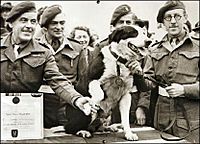Rob (dog) facts for kids

Rob with his Dickin Medal and SAS troopers, Royal Hospital, Chelsea, September 1945
|
|
| Species | Dog |
|---|---|
| Breed | Collie |
| Sex | Male |
| Born | 1939 |
| Died | 18 January 1952 Tetchill, Shropshire |
| Nation from | British |
| Employer | Special Air Service |
| Notable role | Military Dog |
| Owner | Basil and Heather Bayne |
| Awards | Dickin Medal RSPCA silver medal |
Rob (born 1939, died 1952) was a brave Collie dog. In 1945, he received the Dickin Medal. This award is like the Victoria Cross for animals. People said Rob made over 20 parachute jumps. He served with the SAS in North Africa. But in 2006, a secret came out. It seemed his amazing story might have been a trick. Some soldiers may have made it up. They wanted to keep Rob from going back to his first owners.
Contents
Rob's Early Life and Military Service
Rob was a working dog on a farm. This farm was in Shropshire, England. In 1942, his owners, Basil and Heather Bayne, offered him for war service. Rob became a war dog.
He was sent to the Special Air Service (SAS). This was a special military group. Rob's base was in Wivenhoe Park, Essex. His official army number was 471/322. Rob worked as a messenger. He also helped as a guard dog.
The Dickin Medal Award
Rob received his special medal in London. The ceremony was on February 3, 1945. The award said he made "20 parachute jumps." It also mentioned his service with the army in North Africa and Italy.
The Dickin Medal is a very important award. It is given to animals for their bravery. Many people call it the "animals' Victoria Cross." Rob also won other awards. One was a silver medal from the RSPCA.
Was Rob's Story a Hoax?
Years later, a different story came out. A man named Quentin Hughes wrote a book. He was a soldier in the 2nd SAS. In his book, Who Cares Who Wins?, he said Rob's story was not true. He wrote that Rob did not make parachute jumps. Instead, Rob was a companion to Tom Burt. Tom Burt was in charge of supplies for the soldiers.
Hughes wrote that Rob's family wanted him back. To keep Rob with them, Hughes and Burt made up stories. They made Rob's actions sound much more exciting. They even tried to make Rob do a parachute jump. But the weather was too windy. It was not safe to drop Rob that day.
Even without the jump, they sent a letter to Rob's owners. The letter described Rob's "brave" actions. Rob's owners then shared this letter with an animal charity. This led to Rob getting the Dickin Medal in 1945.
Quentin Hughes died in 2004. But the truth about Rob's story came out in 2006. A painting of Rob was in an art show. It was called "The Animals War." Hughes' friend, Mickey King, remembered the story. He said Hughes told him, "Nobody survived 20 parachute drops, let alone a dog. You were lucky to survive three." This made people think the story was a trick.
Rob's Later Life
After his time in the army, Rob went home. He returned to his owners in Tetchill, Shropshire. Rob lived until 1952. He was 12 and a half years old when he died.
Rob was buried on the family farm. A stone memorial marks his grave. It says: "To the dear memory of Rob, war dog no 471/322, twice VC, Britain's first parachute dog, who served three and a half years in North Africa and Italy with the Second Special Air Service Regiment. Died 18th January 1952 aged 12 1/2 years. Erected by Basil and Heather Bayne in memory of a faithful friend and playmate 1939–1952."
Rob in Books
A children's book has been written about Rob. It is called Rob the Paradog. Dorothy Nicholle wrote the book. Blue Hills Press published it.
 | William M. Jackson |
 | Juan E. Gilbert |
 | Neil deGrasse Tyson |

